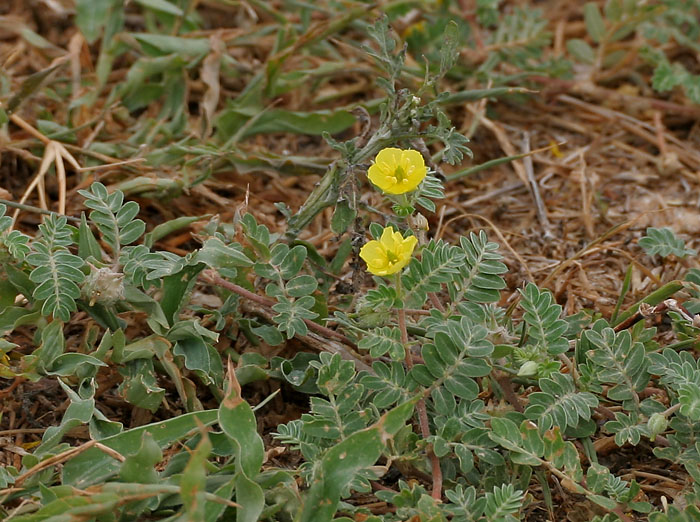Tribulus terrestris, also known as Puncture Vine, is a plant that belongs to the Zygophyllaceae family. It is native to warm temperate and tropical regions of Europe, Asia, Africa and Australia. Although Tribulus is considered a noxious weed in the United States and Australia, it is widely used to enhance sexual desire in both men and women, and to treat erectile dysfunction in men.
Tribulus terrestris Natural Habitat
Tribulus terrestris is a low-growing flowering plant with small yellow flowers. Although native to the Old World, it has become naturalised throughout the rest of the World in warm climates, and can thrive in deserts and other poor growing conditions. It grows as an annual in colder climates. It gets its most commonly used name, Puncture Vine, from the caltrop-like seeds, which, when mature, are capable of puncturing feet, hooves and even bicycle tires.
It is extremely resistant to most of the techniques commonly used to control invasive plants, partly because the seeds maintain their viability for many years.
Other Names of Tribulus terrestris
The plant has many other common names besides Puncture Vine, including; Bindi, Devil’s Thorn, Devil’s Weed, Caltrop, Goat head and Tackweed.
Tribulus terrestris Active Ingredients
The fruits, leaves and roots of Tribulus terrestris are used for a variety of medical purposes. The active ingredients in Tribulus Terrestris include; saponins, lignin amides, flavonoids, alkaloids and glycosides.
Medical Uses of Tribulus
Tribulus has a long history of use in traditional Chinese medicine and Indian Ayurvedic practice. Historically, Tribulus has been used to treat a wide variety of conditions. It is mainly used by athletes to increase strength and muscle mass, as well as for sexual enhancement in both men and women, and to treat erectile dysfunction in men.
Tribulus as a supplement is believed to; enhance athletic performance, increase muscle strength and improve stamina. It is also popularly used as a natural remedy for various health conditions, including; sexual dysfunction, infertility, cardiovascular disorders, antioxidant, anti-inflammatory, improving mood, reducing stress and supporting overall well-being.
Tribulus terrestris to Increase Testosterone
Tribulus terrestris supplements are often marketed as testosterone boosters.
Body builders use Tribulus after a cycle of anabolic steroids to restore testosterone levels in the body.
A study in Bulgaria in the seventies alleged that it encouraged androgen production and reception. Some attribute the Olympic success of the Bulgarian weight-lifting team to the use of this herb.
Tribulus terrestris for Reproductive Health
As a dietary supplement, Tribulus has been shown in animal studies to increase levels of testosterone and enhance nitric oxide production. This can improve blood flow, leading to increased libido and sexual function in both men and women. It is also believed to increase sperm production in men and egg production in women, as well as being able to treat erectile dysfunction.
Tribulus terrestris for Cardiovascular Health
Tribulus is believed to be helpful in treating some cardiovascular conditions including; angina pectoris, high blood pressure, high cholesterol, anemia, poor circulation and as a diuretic to treat hypertension.
Tribulus terrestris for Digestive Health
Digestive disorders that may benefit from the use of puncture vine include constipation and flatulence. It is used in Chinese medicine as a liver tonic, and for food poisoning and overeating. It has many uses in the Ayurvedic tradition, including pacifying vata, as a diuretic and to treat disorders of the genitourinary system.
Tribulus for Kidney Stones and Urinary Tract Infections
Tribulus is believed to help prevent both oxalate and struvite kidney stones. It is believed to have antiseptic and diuretic properties that can reduce the incidence of urinary tract infections.
Tribulus terrestris for Allergies
Tribulus is used as a treatment internally and externally for immune disorders, such as allergic skin conditions, eczema and psoriasis.
How to take Tribulus terrestris
While all parts of the plant can be used, most preparations utilise the roots or seed pods. The roots and seeds may be dried, powdered and taken in a capsule, or used as a tea.
The active ingredients are sometimes made into extracts and tinctures for internal use.
Tribulus is commercially available in all these forms, as well as creams and gels for external application. Dosages recommended vary widely depending on the condition being treated.
Always take care when taking herbs and Read Our Disclaimer.
Tribulus Terrestris Notes / Side Effects
It’s important to note that while Tribulus terrestris is generally considered safe for most people when used as directed, it may cause side effects in some individuals, such as gastrointestinal upset, headache, and insomnia.
Pregnant and breastfeeding women are advised Not to take Tribulus.
Tribulus should not be used by women with a history of breast or uterine cancers.
Individuals with existing medical conditions, or those taking medications, should consult with a healthcare professional before using Tribulus terrestris supplements.
Tribulus Terrestris may cause stomach upset, but this can usually be controlled by taking the herb with food. It may affect blood sugar levels.
Research suggests it can increase prostate size, so should not be used by men with enlarged prostates.
References:
Image sourced from: J.M.Garg, CC BY-SA 4.0 https://creativecommons.org/licenses/by-sa/4.0, via Wikimedia Commons


Leave a Reply